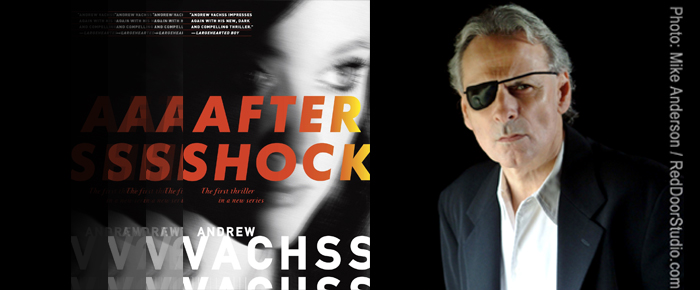
By Heidi Simmons
—–
Aftershock
By Andrew Vachss
Fiction
—–
A CVW reader suggested that I needed to include more male authors in my column after what he perceived as numerous weeks of only female authors. He added that he never reads woman writers. So I set aside the “chick-lit” and over the last several weeks, sought out some testosterone driven works of fiction. In Andrew Vachss’ Aftershock, (Pantheon, 354 pages) masculinity runs amok.
The story is about Dell, who has given up a career as a globe trotting mercenary, contract killer and French Foreign Legionnaire to marry Dolly. He can hardly believe his good fortune that such a beautiful and educated woman would agree to marry him knowing what he is. The two must give up their past and make a new start with new names and a new town.
Dell will do anything to ensure Dolly’s happiness. Even if it means resuming his old habits of killing people for such little infringements as trespassing or harming something Dolly loves. Dell is so good at murdering people in clever, secretive ways that the authorities are either stumped or come to the exact conclusion Dell has set for them. Clues point in every direction but Dell’s.
As far as Dolly knows, their little town is perfect and Dell plans on keeping it that way.
Dolly becomes a confidante and friend to local high school kids. They regularly come to Dolly and Dell’s home to hang out and talk. On the last day of school, one of the girls, Marylou, shoots and kills a boy in the hall and injures two others. The case seems clear and she is arrested for murder.
Although the incident is all caught on school surveillance cameras, Dolly can’t believe Marylou could do such a thing. Marylou, also known as “Might Mary,” is a star athlete with a scholarship to the university of her choice. She’s never been in trouble and is a good student. Why would she risk her future?
Dolly is distraught and wants to help Marylou any way she can. She tells Dell they are the only ones who can do something since Marylou’s family is made up of drunkards and deadbeats. Worse yet, Marylou admits her crime.
Poor Dolly. Dell just can’t stand to see her unhappy. With the wisdom of a trained killer, he gets to the bottom of the crime. With copious amounts of cash, generous friends and a willing attorney, Dell becomes a private investigator who alone discovers a shocking conspiracy.
Their sleepy little dream community has an ugly underbelly. There is a secret society that has been preying on young girls for over a decade and the authorities have chosen to look the other way. Thirty-six girls have been raped and those are the ones who went to the police. All the girls were between the ages of 11 and 14.
Thankfully, the killer with a moral compass is setting things right. By God, Dolly will have her paradise restored. What appeared to be an impossible situation to defend becomes a trial the prosecution cannot win. Dell is going to get justice for Marylou and personally handle the gang of raping hoodlums.
The jury, as well as the community, is finally forced to stand up and face the ghastly reality. Among them is a clan of misogynistic terrorists who have openly allowed the dehumanization of women. To acquit Marylou is to stop debasing the female population. What will the jury do?
Aftershock is told in a first person narration like diary entries only without any dates. Dell is an Asperger bully who clearly believes he is above the law. If Dolly only knew? Or perhaps she does and gets off on just how far Dell will go for her.
There are no chapters in this meandering, convoluted journal of a killer. Although a compelling story lurks underneath, it is more of a lecture on sex crimes and the legal challenge to prosecute rapists. The laws and sex crimes are written as if the author cut and pasted them into the diary. Vachss tells us so much about mercenary training and lifestyle, at times the book is like a manual.
Aftershock is not a clever psychological or suspense thriller. It is not an exciting courtroom drama. It is not an interesting case study of a tormented killer trying to make right with the world. All these elements are present in the text, but Vachss fails to weave an engaging tale.
The dialogue is dull. There is too much meaningless description. The information becomes tedious and redundant. However, the mystery is fresh, if you can stand to wade through all the fragmented exposition.
Aftershock fails to answer the most obvious questions of the plot: If those in authority let the secret society continue for a decade or more, are the former rapists of the community now in positions of power concealing their involvement? Ignored in the story: Why did the gang want to degrade the young girls in their town? For power? Control? Or is it an unnamed religious cult?
These would have been fascinating plot points for Dell to discover. Maybe that’s why Dell didn’t learn anything about himself. He can’t see the motive of others, nor does he understand his own.
There are serious questions and concerns raised in Aftershock about rape and how it is used against women in this country and around the world. If these issues were cleverly imbedded within a well-told story, Aftershock would be powerful and meaningful work. Sadly, the issues are lost in a failed narrative structure.
The author is an attorney who represents children and his wife has written a non-fiction book about sex crimes. Vachss has written over 23 books and the sequel to Aftershock is due out in June. Maybe Vachss should try writing from another voice. Perhaps a little distance will help the author get a better picture.











































